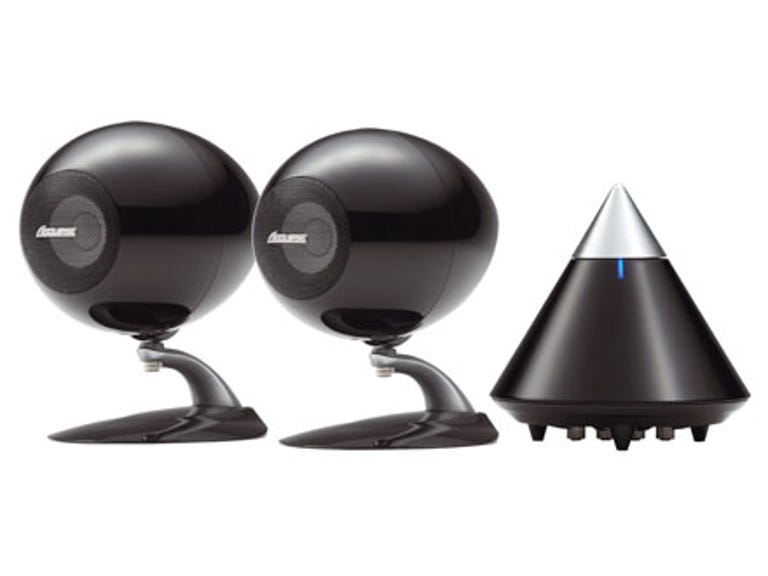 Why You Can Trust CNET
Why You Can Trust CNET Eclipse TD307PAII review: Eclipse TD307PAII
If you're looking to replace the speakers that came with your PC, there's no doubt that the Eclipse TD307PAII speakers could do the job a billion times better. Their unique sound is the work of fine engineering so you can turn off the lights and pretend your favourite artists are in the room with you
The speakers that came with your PC are likely to do the job of playing Windows error beeps satisfactorily, but what about when you want to fire up some Beethoven, James Blunt or Slayer?
The Good
The Bad
The Bottom Line
Eclipse's TD307PAII setup isn't your average PC audio solution. At £400 it has been engineered to produce the most sonically accurate reproduction of music as is possible. It comprises a pair of TD307II speakers and a TDA501II amplifier -- each available separately if desired.
A massive amount of engineering has gone into producing these egg-shaped treats, but was it a waste of precious time?
Strengths
There's no kidding that these are snazzy little devils. They're beautifully designed and ornately finished, with a thick glossy enclosure and the build-quality of the finest war machine. Not only can they be set beside your new MacBook Air or even your whopping great XPS, they can be mounted on a wall or even the ceiling, thanks to the adjustable stand and built-in mounting bracket.
Stylish also is the accompanying amp. Rated at 12W, this pyramid-esque system may look like a trendy electric pencil sharpener from the 80s, but it's actually a very capable amp with extremely low levels of distortion. The power brick is kept away from the electronics so as to assist the sonic accuracy of the sounds it's producing.
This brings us to sound quality. The speakers themselves utilise a single full-range driver, meaning no dedicated woofer and tweeter for lows and highs. This eliminates the need for a crossover, something Eclipse believes introduces an element of distortion into reproduced audio. To avoid the speakers colouring the sound, the driver is unattached to the enclosures. Instead, they're mounted directly on to the speaker stand, with air from behind the driver being released through an exhaust port to the rear.
Each driver is balanced in its output, with good degrees of separation between instruments. Feist's hit '1234' has been wonderfully recorded, and the Eclipses reproduce the studio with warmth and feeling. Turn the lights off, and visualising every musician's position on the stage is simple. The small group of clappers, the subtle tambourine, that unique banjo sound... they're all performing in front of your desk, or may as well be.
Chris Carrabba's passionate vocals and guitar technique with Dashboard Confessional provided the Eclipses with a more hard-hitting challenge than Feist's half-country, half-pop stylings. Multiple steel-string guitars are pounded, along with drums and piercing vocals. Again, this was convincingly reproduced, with the attack of each guitar chord almost visible in front of the speakers.
Weaknesses
But don't think they'll replace the hi-fi cabinets in your front room -- they are blinkin' magnificent speakers, but they're truly a desktop-centric breed. They excel at lower volumes and cranking them up too high will give you some complaint-worthy distortion, notably caused by slightly overzealous low-end that should, and can, be passed onto a sub.
The lack of a precise tweeter squealing out the icy detail of extremely high frequencies means there's an ever-so-slight reduction of brightness. It's a tonal quality seldom missed by certain audiophiles, and whether this appeals to you is too subjective to even attempt to quantify. Whether you like it because it lets the speaker create a more natural sound or hate it because it's not what you expect is up to you.
Conclusion
There's no doubt in our minds that the Eclipse TD307PAII is a terrific set of desktop speakers, and a billion times better than the £15 job you snagged from Argos in a hurry. They have a very unique sound, one achieved with very precise engineering and an intricate understanding of sound and air. If you're looking to monitor your own recordings or put yourself centre stage at the non-ear splitting performance you crave, you'll love them.
If, however, you're just looking to hook up a set of speakers powerful enough to instantly turn ice cubes back into water, you should look elsewhere -- these speakers should be reserved for the audio purists when they're mixing in their small London apartments or quaint home studios.
Edited by Jason Jenkins
Additional editing by Shannon Doubleday
